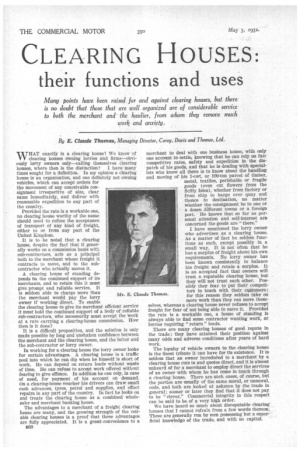CLEARING HOUSES:
Page 92

Page 93

If you've noticed an error in this article please click here to report it so we can fix it.
thenfunctions and uses
WHAT exactly is a clearing house? We know of clearing houses owning lorries and firms—obviously lorry owners only—calling themselves clearing houses, where then is the distinction? I have many times sought for a definition. In my opinion a clearing house is'an organization, and one definitely not owning vehicles, which can accept orders for the movement of any conceivable consignment irrespective of size, clear same immediately, and deliver with reasonable expedition to any part of the country.
Provided the rate is a workable one, no clearing house worthy of the name should need to refuse the acceptance of transport of any kind of freight, either to or from any part of the United Kingdom.
It is to be noted that a clearing house, despite the fact that it generally works on a commission basis win-, sub-contractors, acts as a principal both to the merchant whose freight it contracts to move, and to the subcontractor who actually moves it.
A clearing house of standing depends on the continued support of its merchants, and to retain this it must give prompt and reliable service. It is seldom able to charge more than the merchant would pay the lorry owner if working direct. To enable the clearing house to give its merchant efficient service it must hold the continued support of a body of reliable sub-contractors, who necessarily must accept the work at a rate carrying a clearing-house commission. How then is it done?
It is a difficult proposition, and the solution is only made possible by long and unshaken confidence between the merchant and the clearing house, and the latter and the sub-contractor or lorry owner.
In working for a clearing house the lorry owner looks for certain advantages. A clearing house is a traffic pool into which he can dip when he himself is short of work. He can depend on return loads without waste of time. He can refuse to accept work offered without fearing to give offence. In addition he can rely, in case of need, for payment of his account on demand, On a clearing-house voucher his drivers can draw small cash advances, tyres, petrol and supplies, and effect repairs in any part of the country. In fact he looks on and treats the clearing house as a combined wholesaler and merchant banking house.
The advantages to a merchant of a freight clearing house are many, and the growing strength of the reliable clearing houses is a proof that these advantages are fully appreciated. It is a great convenience to a merchant to deal with one business house, with only one account to settle, knowing that he can rely on fair competitive rates, safety and expedition in the dispatch of his goods, and that he is dealing with specialists who know all there is to know about the handling and moving of his 1-cwt. or 100-ton parcel of timber, metal, textiles, perishable or fragile goods (even cut flowers from the Scilly Isles), whether from factory or from ship to barge over quay and thence to destination, no matter whether the consignment be to one or a dozen different towns or a foreign port. He knows that so far as personal attention and self-interest are concerned the goods are "there."
I have mentioned the lorry owner who advertises as a clearing house. As a matter of fact he seldom functions as such, except possibly in a small way. It is not often that he has a surplus of freight above his own requirements. No lorry owner has been known consistently to balance his freight and retain a surplus. It is an accepted fact that owners will trust a reputable clearing house, but they will not trust each other. Possibly they fear to put their competitors in touch with their customers; for this reason they seldom take on more work than they can move themselves, whereas a clearing house never refuses to accept freight for fear of not being able to move it. Provided the rate is a workable one, a house of standing is always able to find some contractor wanting work, or lorries requiring " return " loads.
There are many clearing houses of good repute in the trade; they have attained their position against many odds and adverse conditions after years of hard work.
The loyalty of vehicle owners to the clearing house is the finest tribute it can have for its existence. It is seldom that an owner introdueed to a merchant by a clearing house cuts in and quotes direct, and it is almost unheard of for a merchant to employ direct the services of an owner with whom he has come in touch through a clearing house. There are such cases, of course, but the parties are usually of the same moral, or unmoral, code, and both are looked at askance by the trade in general; sooner or later they find that it does not pay to be "clever." Commercial integrity in this respect can be said to be of a very high order.
We have heard so much about disreputable clearing houses that I cannot refrain from a few words thereon. These are generally run by men possessing but a superficial knovviedge of the trade, and with no capital.
IT is generally recognized that the organized and well-conducted clearing house is performing a valuable service not only to the road transport industry but also to the trading community as a whole.
In regard to the latter, many traders find it a great convenience to be able to entrust their traffic to a central organization, instead of being compelled to hand goods to various contractors who run only on specified routes. This method has the additional advantage that accounts to the traders are stabilized on a monthly basis and the position in regard to liability for loss or damage is clarified.
They clearing house, through its knowledge or various contractors' services, is in a position to accept traffic in large or small quantities for a number of destinations served by regular schedule services. Furthermore, it is only by means of a central organization that " smalls " traffic can be extensively dealt with. This type or traffic is now developing very considerably, to the benefit of the transport operator. It is a distinct advantage if the clearing house can run its own depot or transit shed for the bulking of " smalls " on the long-distance vehicles.
In respect of its relations with the operator, the clearing house should work on a strictly commission basis, paying the operator the rate that it receives, less an agreed commission. Unfortunately it is the practice of some clearing houses to obtain quotations for traffic, thus setting one contractor against another, with the result that a considerable amount of unnecessary rate-cutting is indulged in. It should not be the function of any clearing house to set itself up in competition
with the haulage contractor, but rather the two should work in close harmony, the haulage contractor looking to the clearing house to pay him an economic rate.
Some of the smaller haulage contractors, and particularly those of the owner-driver type, depend very largely upon the clearing house for their livelihood, and this has the good effect of restraining these men from competing one with another. Unfortunately, some clearing houses have adopted the practice of tempting men into the haulage business by offering to supply vehicles on hire-purchase terms, but this is a practice which should not be considered as clearinghouse work. The hire-purchase system has many evils as well as advantages, but this aspect does not come within the scope of the present article.
The council of the Long Distance Road Haulage Association has had the question of clearing houses under consideration for some time now, and is endeavouring to set up a special clearing-house section. A representative committee of leading clearing houses will then be appointed, and this committee will set itself the task of drawing up definite regulations which will be agreed to by all who ate members of the association. These regulations will be binding upon contractors as well as clearing houses, and by this means the recommendation in the Final Report of the Royal Commission on Transport that the better organization of the industry will improve the position in regard to the clearing houses, will be carried out.
There is little doubt that clearing-house work on sound lines can achieve a great deal in the way of coordination and the better organization of the industry.
















































































































































































